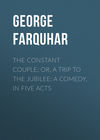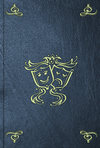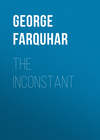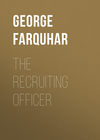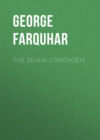Buch lesen: «The Constant Couple; Or, A Trip to the Jubilee: A Comedy, in Five Acts», Seite 5
Clinch. jun. No, no; Dicky, carry this spark before a justice, and when he has made oath, you may discharge him. And I'll go see Angelica. [Exeunt Dicky and Tom.] Now that I'm an elder brother, I'll court, and swear, and rant and rake, and go to the Jubilee with the best of them. [Exit.
SCENE II
Lady Lurewell's House
Enter Lady Lurewell and Parly
Lure. Are you sure that Vizard had my letter?
Parly. Yes, yes, madam; one of your ladyship's footmen gave it to him in the Park, and he told the bearer, with all transports of joy, that he would be punctual to a minute.
Lady L. Thus most villains some time or other are punctual to their ruin; Are all things prepared for his reception?
Parly. Exactly to your ladyship's order: the alderman too is just come, dressed and cooked up for iniquity.
Lady L. Then he has got woman's clothes on?
Parly. Yes, madam, and has passed upon the family for your nurse.
Lady L. Convey him into that closet, and put out the candles, and tell him, I'll wait on him presently. When he is tired of his situation, let the servants pretend they take him for a common rogue, come with the intent to rob the house, and pump him heartily.
[As Parly goes to put out the Candles, somebody knocks. – Music plays without.
Lady L. This must be Sir Harry; tell him I am not to be spoken with.
Parly. Sir, my lady is not to be spoken with.
Sir H. [Without.] I must have that from her own mouth, Mrs. Parly. Play, gentlemen.
[Music plays again.
Enter Sir Harry
Lady L. 'Tis too early for serenading, Sir Harry.
Sir H. Wheresoever love is, there music is proper.
Lady L. But, Sir Harry, what tempest drives you here at this hour?
Sir H. No tempest, madam, but love madam.
[Wildair taking her by the Hand.
Lady L. As pure and white as angels' soft desires.
Sir H. Fierce, as when ripe consenting beauty fires.
Lady L. [Aside.] If this be a love token, [Wildair drops a ring, she takes it up.] your mistress's favours hang very loose about you, sir.
Sir H. I can't, justly, madam, pay your trouble of taking it up, by any thing but desiring you to wear it.
Lady L. You gentlemen have the cunningest ways of playing the fool, and are so industrious in your profuseness. Speak seriously, am I beholden to chance or design for this ring?
Sir H. To design, upon my honour. And I hope my design will succeed. [Aside.
Lady L. Shall I be free with you, Sir Harry?
Sir H. With all my heart, madam, so I may be free with you.
Lady L. Then plainly, sir, I shall beg the favour to see you some other time; for at this very minute I have two lovers in the house.
Sir H. Then to be as plain, I must begone this minute, for I must see another mistress within these two hours.
Lady L. Frank and free.
Sir H. As you with me – Madam, your most humble servant. [Exit.
Lady L. Nothing can disturb his humour. Now for my merchant and Vizard.
[Exit, and takes the Candles with her.
Enter Parly, leading in Smuggler,
dressed in Woman's Clothes.
Parly. This way, Mr. Alderman.
Smug. Well, Mrs. Parly, – I'm obliged to you for this trouble: here are a couple of shillings for you. Times are hard, very hard indeed; but next time I'll steal a pair of silk stockings from my wife, and bring them to you – What are you fumbling about my pockets for?
Parly. Only setting the plaits of your gown: here, sir, get into this closet, and my lady will wait on you presently.
[Puts him into the Closet, runs out, and returns with Vizard.
Vizard. Where wouldst thou lead me, my dear auspicious little pilot?
Parly. You're almost in port, sir; my lady's in the closet, and will come out to you immediately.
Vizard. Let me thank thee as I ought. [Kisses her.
Parly. Pshaw, who has hired me best? a couple of shillings, or a couple of kisses?
[Exit Parly.
Vizard. Propitious darkness guides the lover's steps; and night, that shadows outward sense, lights up our inward joy.
Smug. My nephew's voice, and certainly possessed with an evil spirit.
Vizard. Ha! I hear a voice. Madam – my life, my happiness, where are you, madam?
Smug. Madam! He takes me for a woman too: I'll try him. Where have you left your sanctity, Mr. Vizard?
Vizard. Talk no more of that ungrateful subject – I left it where it has only business, with day-light; 'tis needless to wear a mask in the dark.
Smug. Well, sir, but I suppose your dissimulation has some other motive besides pleasure?
Vizard. Yes, madam, the honestest motive in the world – interest – You must know, madam, that I have an old uncle, Alderman Smuggler; you have seen him, I suppose.
Smug. Yes, yes, I have some small acquaintance with him.
Vizard. 'Tis the most knavish, precise, covetous old rogue, that ever died of the gout.
Smug. Ah, the young son of a whore! [Aside.] Well, sir, and what of him?
Vizard. Why, madam, he has a swingeing estate, which I design to purchase as a saint, and spend like a gentleman. He got it by cheating, and should lose it by deceit. By the pretence of my zeal and sobriety, I'll cozen the old miser, one of these days, out of a settlement and deed of conveyance —
Smug. It shall be a deed to convey you to the gallows then, ye young dog. [Aside.
Vizard. And no sooner he's dead, but I'll rattle over his grave with a coach and six, to inform his covetous ghost how genteelly I spend his money.
Smug. I'll prevent you, boy; for I'll have my money buried with me. [Aside.
Vizard. Bless me, madam! here's a light coming this way. I must fly immediately. – When shall I see you, madam?
Smug. Sooner than you expect, my dear.
Vizard. Pardon me, dear madam, I would not be seen for the world. I would sooner forfeit my life, my pleasure, than my reputation. [Exit.
Smug. Egad, and so would I too. [Exit.
ACT THE FIFTH
SCENE I
Lady Darling's House
Enter Lady Darling and Angelica
Lady D. Daughter, since you have to deal with a man of so peculiar a temper, you must not think the general arts of love can secure him; you may therefore allow such a courtier some encouragement extraordinary, without reproach to your modesty.
Ang. I am sensible, madam, that a formal nicety makes our modesty sit awkward, and appears rather a chain to enslave, than a bracelet to adorn us; it should show, when unmolested, easy and innocent as a dove, but strong and vigorous as a falcon, when assaulted.
Lady D. I'm afraid, daughter, you mistake Sir Harry's gaiety for dishonour.
Ang. Though modesty, madam, may wink, it must not sleep, when powerful enemies are abroad. I must confess, that, of all men's, I would not see Sir Harry Wildair's faults.
Lady D. You must certainly be mistaken, Angelica; for I'm satisfied Sir Harry's designs are only to court and marry you.
Ang. His pretence, perhaps, was such. Pray, madam, by what means were you made acquainted with his designs?
Lady D. Means, child! Why, my cousin Vizard, who, I'm sure, is your sincere friend, sent him. He brought me this letter from my cousin.
[Gives her the Letter, which she opens.
Ang. Ha! Vizard! – then I'm abused in earnest – Would Sir Harry, by his instigation, fix a base affront upon me? No, I can't suspect him of so ungenteel a crime – This letter shall trace the truth. [Aside.] – My suspicions, madam, are much cleared; and I hope to satisfy your ladyship in my management, when I next see Sir Harry.
Enter Servant
Serv. Madam, here's a gentleman below, calls himself Wildair.
Lady D. Conduct him up. [Exit Servant.] Daughter, I won't doubt your discretion.
[Exit Lady Darling.
Enter Sir Harry Wildair
Sir H. Oh, the delights of love and Burgundy! – Madam, I have toasted your ladyship fifteen bumpers successively, and swallowed Cupids like loches to every glass.
Ang. And what then, sir?
Sir H. Why, then, madam, the wine has got into my head, and the Cupids into my heart; and unless, by quenching quick my flame, you kindly ease the smart, I'm a lost man, madam.
Ang. Drunkenness, Sir Harry, is the worst pretence a gentleman can make for rudeness; for the excuse is as scandalous as the fault. Therefore, pray consider who you are so free with, sir; a woman of condition, that can call half a dozen footmen upon occasion.
Sir H. Nay, madam, if you have a mind to toss me in a blanket, half a dozen chambermaids would do better service. Come, come, madam; though the wine makes me lisp, yet it has taught me to speak plainer. By all the dust of my ancient progenitors, I must this night rest in your arms.
Ang. Nay, then – who waits there?
Enter Footmen
Take hold of that madman, and bind him.
Sir H. Nay, then, Burgundy's the word; slaughter will ensue. Hold – Do you know, scoundrels, that I have been drinking victorious Burgundy? [Draws.
Servants. We know you're drunk, sir.
Sir H. Then how have you the impudence, rascals, to assault a gentleman with a couple of flasks of courage in his head?
Servants. We must do as our young mistress commands us.
Sir H. Nay, then, have among ye, dogs! [Throws Money among them; they scramble and take it up: he pelting them out, shuts the Door, and returns.] Rascals, poltroons! – I have charmed the dragon, and now the fruit's my own. I have put the whole army to flight; and now I'll take the general prisoner.
[Laying hold on her.
Ang. I conjure you, sir, by the sacred name of Honour, by your dead father's name, and the fair reputation of your mother's chastity, that you offer not the least offence. Already you have wronged me past redress.
Sir H. Thou art the most unaccountable creature —
Ang. What madness, Sir Harry, what wild dream of loose desire, could prompt you to attempt this baseness? – View me well – the brightness of my mind, methinks, should lighten outwards, and let you see your mistake in my behaviour.
Sir H. [Mimicking.] Tal tidum, tidum, tal ti didi didum. A million to one, now, but this girl is just come flush from reading the Rival Queens – 'Egad, I'll at her in her own cant – Oh, my Statira! Oh, my angry dear! turn thy eyes on me – behold thy beau in buskins.
Ang. Behold me, sir; view me with a sober thought, free from those fumes of wine that throw a mist before your sight, and you shall find that every glance from my reproaching eyes is armed with sharp resentment, and with a virtuous pride that looks dishonour dead.
Sir H. This is the first whore in heroics that I have met with. [Aside.] Lookye, madam, as to that slender particular of your virtue, we sha'n't quarrel about it; you may be as virtuous as any woman in England, if you please. But, pray, madam, be pleased to consider, what is this same virtue that you make such a mighty noise about – Can your virtue keep you a coach and six? No, no; your virtuous women walk on foot. – Can your virtue stake for you at picquet? No. Then what business has a woman with virtue? Come, come, madam, I offered you fifty guineas; there's a hundred – The devil! – virtuous still! – Why, it is a hundred, five score, a hundred guineas.
Ang. Oh, indignation! Were I a man, you durst not use me thus. But the mean, poor abuse you throw on me, reflects upon yourself: our sex still strikes an awe upon the brave, and only cowards dare affront a woman.
Sir H. Affront! 'Sdeath, madam, a hundred guineas will set you up a bank at basset; a hundred guineas will furnish out your closet with china; a hundred guineas will give you an air of quality; a hundred guineas will buy you a rich cabinet for your billet-doux, or a fine Common Prayer Book for your virtue; a hundred guineas will buy a hundred fine things, and fine things are for fine ladies, and fine ladies are for fine gentlemen, and fine gentlemen are – 'Egad, this Burgundy makes a man speak like an angel – Come, come, madam, take it, and put it to what use you please.
Ang. I'll use it as I would the base unworthy giver, thus —
[Throws down the Purse, and stamps upon it.
Sir H. I have no mind to meddle in state affairs; but these women will make me a parliament-man in spite of my teeth, on purpose to bring in a bill against their extortion. She tramples under foot that deity which all the world adores – Oh, the blooming pride of beautiful eighteen! – Pshaw! – I'll talk to her no longer; I'll make my market with the old gentlewoman; she knows business better – [Goes to the Door.] – Here, you, friend: pray, desire the old lady to walk in – Harkye, 'egad, madam, I'll tell your mother.
Enter Lady Darling
Lady D. Well, Sir Harry, and how d'ye like my daughter, pray?
Sir H. Like her, madam! – Harkye, will you take it? – Why, 'faith, madam – Take the money, I say, or, 'egad, all's out.
Ang. All shall out – Sir, you are a scandal to the name of gentleman.
Sir H. With all my heart, madam – In short, madam, your daughter has used me somewhat too familiarly, though I have treated her like a woman of quality.
Lady D. How, sir?
Sir H. Why, madam, I have offered her a hundred guineas.
Lady D. A hundred guineas! Upon what score?
Sir H. Upon what score! Lord, lord, how these old women love to hear bawdy! – Why, 'faith, madam, I have never a double entendre ready at present; but I suppose you know upon what score.
Ang. Hold, sir, stop your abusive tongue, too loose for modest ears to hear – Madam, I did before suspect, that his designs were base, now they're too plain; this knight, this mighty man of wit and humour, is made a tool to a knave – Vizard has sent him on a bully's errand, to affront a woman; but I scorn the abuse, and him that offered it.
Lady D. How, sir, come to affront us! D'ye know who we are, sir?
Sir H. Know who you are! Why, your daughter there, is Mr. Vizard's – cousin, I suppose. And for you, madam – I suppose your ladyship to be one of those civil, obliging, discreet old gentlewomen, who keep their visiting days for the entertainment of their presenting friends, whom they treat with imperial tea, a private room, and a pack of cards. Now I suppose you do understand me.
Lady D. This is beyond sufferance! But say, thou abusive man, what injury have you ever received from me, or mine, thus to engage you in this scandalous aspersion.
Ang. Yes, sir, what cause, what motives could induce you thus to debase yourself below your rank?
Sir H. Heyday! Now, dear Roxana, and you, my fair Statira, be not so very heroic in your style: Vizard's letter may resolve you, and answer all the impertinent questions you have made me.
Lady D. and Ang. We appeal to that.
Sir H. And I'll stand to't; he read it to me, and the contents were pretty plain, I thought.
Ang. Here, sir, peruse it, and see how much we are injured, and you deceived.
Sir H. [Opening the Letter.] But hold, madam, [To Lady Darling.] before I read I'll make some condition: – Mr. Vizard says here, that I won't scruple thirty or forty pieces. Now, madam, if you have clapped in another cypher to the account, and made it three or four hundred, 'egad I'll not stand to't.
Lady D. The letter, sir, shall answer you.
Sir H. Well then – [Reads.] Out of my earnest inclination to serve your ladyship, and my cousin Angelica– Ay, ay, the very words, I can say it by heart —I have sent Sir Harry Wildair to– What the devil's this? —Sent Sir Harry Wildair to court my cousin– He read to me quite a different thing —He's a gentleman of great parts and fortune– He's a son of a whore, and a rascal —And would make your daughter very happy [Whistles.] in a husband. – [Looks foolish, and hums a Song.] – Oh! poor Sir Harry, what have thy angry stars designed?
Ang. Now, sir, I hope you need no instigation to redress our wrongs, since even the injury points the way.
Lady D. Think, sir, that our blood for many generations has run in the purest channel of unsullied honour.
Sir H. Ay, madam. [Bows to her.
Ang. Consider what a tender flower is woman's reputation, which the least air of foul detraction blasts.
Sir H. Yes, madam. [Bows to the other.
Lady D. Call then to mind your rude and scandalous behaviour.
Sir H. Right, madam. [Bows again.
Ang. Remember the base price you offered me. [Exit.
Sir H. Very true, madam. Was ever man so catechized?
Lady D. And think that Vizard, – villain Vizard, – caused all this, yet lives: that's all: farewell.
Sir H. Stay, madam, [To Lady Darling.] one word; is there no other way to redress your wrongs, but by fighting?
Lady D. Only one, sir; which, if you can think of, you may do: you know the business I entertained you for.
Sir H. I understand you, madam. [Exit Lady Darling.] Here am I brought to a very pretty dilemma. I must commit murder, or commit matrimony; which is the best now? a license from Doctors' Commons, or a sentence from the Old Bailey? – If I kill my man, the law hangs me; if I marry my woman, I shall hang myself. – But, damn it – cowards dare fight: – I'll marry, that's the most daring action of the two. Exit.
SCENE II
Newgate
Clincher Senior, solus
Clinch. sen. How severe and melancholy are Newgate reflections! Last week my father died; yesterday I turned beau; to-day I am laid by the heels, and to-morrow shall be hung by the neck. – I was agreeing with a bookseller about printing an account of my journey through France and Italy; but now the history of my travels must be through Holborn, to Tyburn. – "The last dying speech of Beau Clincher, that was going to the Jubilee – Come, a halfpenny a-piece." – A sad sound, a sad sound, 'faith! 'Tis one way to make a man's death make a great noise in the world.
Enter Tom Errand
A reprieve! a reprieve! thou dear, dear – damned rogue. Where have you been? Thou art the most welcome – son of a whore; where's my clothes?
Tom. Sir, I see where mine are. Come, sir, strip, sir, strip.
Clinch. sen. Sir, you cannot master me, for I am twenty thousand strong.
[Exeunt, struggling.
SCENE III
Lady Darling's House
Enter Sir H. Wildair, with Cards; Servants following
Sir H. Here, fly all around, and bear these as directed; you to Westminster, you to St. James's, and you into the city. Tell all my friends, a bridegroom's joy invites their presence. Tell them, I am married. If any ask to whom, make no reply; but tell them, that I am married; that joy shall crown the day, and love the night. Begone, fly.
Enter Colonel Standard
A thousand welcomes, friend; my pleasure's now complete, since I can share it with my friend: brisk joy shall bound from me to you; then back again; and, like the sun, grow warmer by reflection.
Colonel S. You are always pleasant, Sir Harry; but this transcends yourself: whence proceeds it?
Sir H. Canst thou not guess, my friend? Whence flows all earthly joy? What is the life of man, and soul of pleasure? Woman. – What fires the heart with transport, and the soul with raptures? – Lovely woman – What is the master-stroke and smile of the creation, but charming, virtuous woman? – Methinks, my friend, you relish not my joy. What is the cause?
Colonel S. Canst thou not guess? – What is the bane of man, and scourge of life, but woman? – What is the heathenish idol man sets up, and is damned for worshipping? Treacherous woman. – Woman, whose composition inverts humanity; their bodies heavenly, but their souls are clay.
Sir H. Come, come, colonel, this is too much: I know your wrongs received from Lurewell may excuse your resentment against her. But it is unpardonable to charge the failings of a single woman upon the whole sex. I have found one, whose virtues —
Colonel S. So have I, Sir Harry; I have found one whose pride's above yielding to a prince. And if lying, dissembling, perjury, and falsehood, be no breaches in a woman's honour, she is as innocent as infancy.
Sir H. Well, colonel, I find your opinion grows stronger by opposition; I shall now, therefore, wave the argument, and only beg you for this day to make a show of complaisance at least. – Here comes my charming bride.
Enter Lady Darling and Angelica
Colonel S. [Saluting Angelica.] I wish you, madam, all the joys of love and fortune.
Enter Clincher Junior
Clinch. jun. Gentlemen and ladies, I'm just upon the spur, and have only a minute to take my leave.
Sir H. Whither are you bound, sir?
Clinch. jun. Bound, sir! I'm going to the Jubilee, sir.
Lady D. Bless me, cousin! how came you by these clothes?
Clinch. jun. Clothes! ha! ha! ha! the rarest jest! ha! ha! ha! I shall burst, by Jupiter Ammon – I shall burst.
Lady D. What's the matter, cousin?
Clinch. jun. The matter! ha! ha! Why, an honest porter, ha! ha! ha! has knocked out my brother's brains – ha! ha! ha!
Sir H. A very good jest, i'faith – ha! ha! ha!
Clinch. jun. Ay, sir; but the best jest of all is, he knocked out his brains with a hammer – and so he is as dead as a door-nail! ha! ha! ha!
Lady D. And do you laugh, wretch?
Clinch. jun. Laugh! ha! ha! ha! let me see e'er a younger brother in England, that won't laugh at such a jest!
Ang. You appeared a very sober, pious gentleman, some hours ago.
Clinch. jun. Pshaw! I was a fool then; but now, madam, I'm a wit; I can rake now. As for your part, madam, you might have had me once; but now, madam, if you should fall to eating chalk, or gnawing the sheets, it is none of my fault. Now, madam, I have got an estate, and I must go to the Jubilee.
Enter Clincher Senior, in a Blanket
Clinch. sen. Must you so, rogue – must ye? You will go to the Jubilee, will you?
Clinch. jun. A ghost! a ghost! send for the Dean and Chapter presently.
